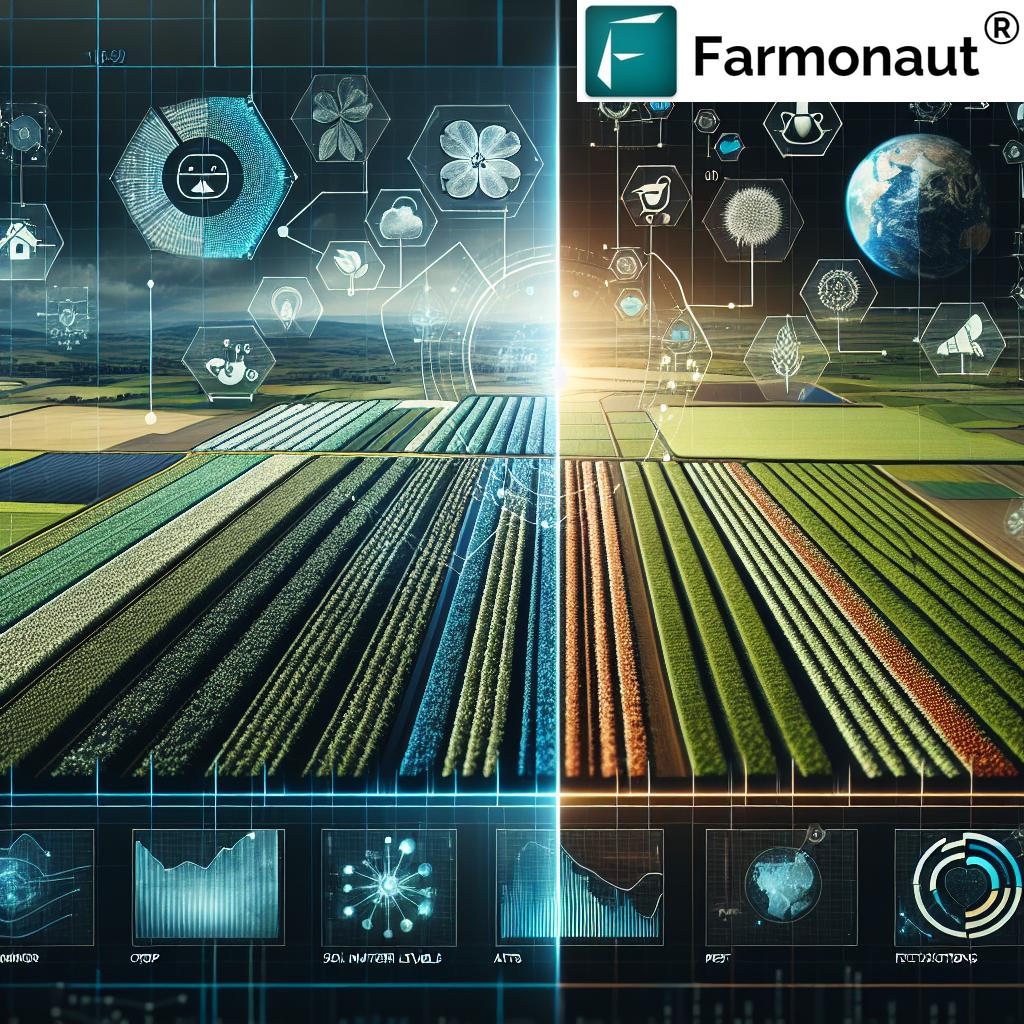Revolutionizing Agriculture: How Farmonaut’s AgriTech Innovation Drives Sustainable Farming Practices
“Precision agriculture can reduce water usage by up to 30% through smart irrigation systems and data-driven decision-making.”
In the ever-evolving landscape of modern agriculture, we are witnessing a remarkable transformation driven by agritech innovation and sustainable farming practices. As we delve into this exciting realm, we’ll explore how cutting-edge agricultural technology solutions are reshaping the industry, addressing pressing challenges, and paving the way for a more sustainable future.
The AgriTech Revolution: A New Era for Farming
The agricultural sector is experiencing a paradigm shift, propelled by the convergence of technology and traditional farming methods. This revolution is not just about increasing productivity; it’s about creating a more sustainable, efficient, and resilient food production system. At the forefront of this transformation are precision agriculture and farm management software, which are empowering farmers with data-driven insights and tools to optimize their operations.

One of the pioneers in this field is Farmonaut, a company that has been at the forefront of integrating satellite technology with agriculture. Their innovative approach combines advanced satellite imagery, artificial intelligence, and machine learning to provide farmers with real-time insights into their crops and land.
Precision Agriculture: The Cornerstone of Modern Farming
Precision agriculture is revolutionizing the way we approach farming. By leveraging technologies such as GPS, sensors, and data analytics, farmers can now make informed decisions about every aspect of their operations. This level of precision allows for:
- Optimized resource allocation
- Reduced environmental impact
- Improved crop yields
- Enhanced farm profitability
Farmonaut’s satellite-based crop health monitoring system exemplifies the power of precision agriculture. By providing farmers with detailed insights into vegetation health, soil moisture levels, and other critical metrics, Farmonaut enables data-driven decision-making that can significantly improve farm efficiency and sustainability.
Smart Irrigation Systems: Conserving Water, Boosting Yields
Water scarcity is a growing concern in agriculture, making efficient irrigation crucial for sustainable farming. Smart irrigation systems, powered by IoT sensors and AI algorithms, are transforming water management in agriculture. These systems can:
- Analyze soil moisture levels in real-time
- Integrate weather forecast data
- Automatically adjust watering schedules
- Reduce water waste while optimizing crop growth
Farmonaut’s platform includes advanced irrigation management tools that help farmers make informed decisions about when and how much to water their crops, leading to significant water savings and improved crop health.
Crop Analytics: Harnessing Data for Better Yields
Crop analytics tools are revolutionizing the way farmers monitor and manage their crops. These sophisticated platforms use a combination of satellite imagery, drone data, and ground-level sensors to provide comprehensive insights into crop health, growth patterns, and potential issues. With Farmonaut’s crop analytics capabilities, farmers can:
- Detect early signs of pest infestations or diseases
- Predict harvest times with greater accuracy
- Optimize fertilizer application
- Make data-driven decisions to improve overall crop management
By leveraging these advanced analytics, farmers can significantly reduce crop losses, improve yields, and make more sustainable use of resources.
“Advanced GIS applications in agriculture have increased crop yield predictions accuracy by 85% in some regions.”
GIS Applications in Agriculture: Mapping the Future of Farming
Geographic Information Systems (GIS) have become an indispensable tool in modern agriculture. These powerful systems allow farmers and agricultural professionals to:
- Create detailed maps of farmland
- Analyze soil composition and topography
- Plan efficient crop rotations
- Monitor and manage natural resources
Farmonaut’s integration of GIS technology with satellite imagery provides farmers with unprecedented insights into their land. This combination allows for precise field mapping, soil analysis, and crop monitoring, enabling farmers to make informed decisions about land use and resource allocation.

Sustainable Farming Practices: The Path to a Greener Future
As the global population continues to grow, the need for sustainable farming practices becomes increasingly crucial. AgriTech innovations are playing a pivotal role in promoting sustainability in agriculture by:
- Reducing water usage through smart irrigation
- Minimizing chemical inputs with precision application techniques
- Improving soil health through data-driven management
- Decreasing carbon emissions with optimized farm operations
Farmonaut’s commitment to sustainability is evident in its carbon footprinting feature, which allows agribusinesses to track and reduce their environmental impact. This tool provides real-time data on emissions, enabling farmers and agricultural companies to take concrete steps towards more sustainable operations.
Empowering Farmers with Data-Driven Decision Making
One of the most significant impacts of AgriTech innovation is the empowerment of farmers through access to data and analytics. With tools like Farmonaut’s Jeevn AI Advisory System, farmers can now make decisions based on:
- Real-time crop health data
- Accurate weather forecasts
- AI-generated crop management strategies
- Historical performance analytics
This wealth of information allows farmers to optimize their operations, reduce risks, and improve their overall productivity and profitability.
Blockchain in Agriculture: Ensuring Transparency and Traceability
Blockchain technology is making significant inroads in agriculture, particularly in supply chain management. Farmonaut’s blockchain-based traceability solution offers numerous benefits:
- Enhanced transparency from farm to consumer
- Improved food safety through traceable produce
- Reduced fraud in the agricultural supply chain
- Increased consumer trust in food products
By implementing blockchain technology, Farmonaut is helping to create a more transparent and accountable agricultural industry, benefiting farmers, consumers, and businesses alike.
The Role of Entrepreneurs in Driving AgriTech Innovation
Entrepreneurs play a crucial role in driving AgriTech innovation forward. These visionaries are:
- Developing new technologies to address agricultural challenges
- Creating platforms that connect farmers with resources and markets
- Fostering collaboration between tech experts and agricultural professionals
- Attracting investment to fund innovative AgriTech solutions
Companies like Farmonaut exemplify this entrepreneurial spirit, constantly pushing the boundaries of what’s possible in agricultural technology and making these innovations accessible to farmers worldwide.
Collaborative Initiatives: Fostering Agribusiness Growth
The future of agriculture lies in collaboration. Industry partners, service providers, and research institutions are joining forces to tackle pressing agricultural challenges. These collaborative efforts are resulting in:
- Innovative solutions to complex farming problems
- Shared knowledge and resources
- Accelerated technology adoption
- Improved sustainability across the agricultural sector
Farmonaut’s partnerships with financial institutions to provide satellite-based verification for crop loans and insurance is a prime example of how collaboration can create value for farmers and the industry as a whole.
The Future of Farming: Trends Shaping AgriTech
As we look to the future, several trends are emerging that will continue to shape the AgriTech landscape:
- Increased use of AI and machine learning in farm management
- Integration of IoT devices for real-time monitoring and automation
- Expansion of vertical farming and urban agriculture
- Development of climate-resilient crop varieties through genetic engineering
- Growing adoption of regenerative agriculture practices
Farmonaut is at the forefront of many of these trends, continuously evolving its platform to incorporate the latest technological advancements and meet the changing needs of farmers and agribusinesses.
AgriTech Solutions Comparison
| AgriTech Solution | Primary Function | Key Benefits | Sustainability Impact |
|---|---|---|---|
| Precision Agriculture Software | Data-driven farm management | Optimized resource use, increased yields | Estimated 25% reduction in input waste |
| Smart Irrigation Systems | Automated water management | Water conservation, improved crop health | Up to 30% reduction in water usage |
| Crop Analytics Tools | Comprehensive crop monitoring | Early issue detection, yield prediction | 15% reduction in crop losses |
| Pest Control Technologies | Targeted pest management | Reduced pesticide use, healthier crops | 20% decrease in chemical application |
| GIS Applications | Spatial analysis and mapping | Improved land use planning, resource management | 10% increase in land use efficiency |
Conclusion: Embracing AgriTech for a Sustainable Future
As we’ve explored throughout this article, AgriTech innovations are revolutionizing agriculture, driving sustainable farming practices, and shaping the future of food production. From precision agriculture and smart irrigation systems to advanced crop analytics and blockchain-based traceability, these technologies are empowering farmers, optimizing resource use, and addressing critical challenges in the agricultural sector.
Companies like Farmonaut are at the forefront of this revolution, providing farmers with accessible, affordable, and powerful tools to transform their operations. By leveraging satellite technology, AI, and data analytics, Farmonaut is making precision agriculture a reality for farmers around the world, regardless of the size of their operations.
As we look to the future, it’s clear that the continued development and adoption of AgriTech solutions will be crucial in meeting the growing global demand for food while ensuring the sustainability of our agricultural practices. By embracing these innovations, we can create a more efficient, resilient, and sustainable agricultural system that benefits farmers, consumers, and the planet alike.
The AgriTech revolution is here, and it’s transforming the way we grow food. As we continue to innovate and collaborate, the possibilities for sustainable, technology-driven agriculture are truly limitless.
FAQ Section
Q: What is AgriTech?
A: AgriTech, short for Agricultural Technology, refers to the use of technology in agriculture, horticulture, and aquaculture to improve yield, efficiency, and profitability. It encompasses a wide range of innovations, including precision farming, IoT sensors, AI-driven analytics, and blockchain for supply chain management.
Q: How does precision agriculture benefit farmers?
A: Precision agriculture benefits farmers by providing detailed, data-driven insights into their operations. This allows for more efficient use of resources, improved crop yields, reduced environmental impact, and increased profitability. Farmers can make informed decisions about planting, irrigation, fertilization, and harvesting based on real-time data and analytics.
Q: What role does satellite technology play in modern farming?
A: Satellite technology plays a crucial role in modern farming by providing high-resolution imagery and data for crop monitoring, land mapping, and weather forecasting. Companies like Farmonaut use satellite data to offer farmers real-time insights into crop health, soil moisture levels, and other critical metrics, enabling more precise and efficient farm management.
Q: How does AgriTech contribute to sustainable farming practices?
A: AgriTech contributes to sustainable farming practices by optimizing resource use, reducing waste, and minimizing environmental impact. Smart irrigation systems conserve water, precision application of fertilizers and pesticides reduces chemical use, and data-driven decision-making helps farmers implement more sustainable land management practices.
Q: What is the future of AgriTech?
A: The future of AgriTech is likely to see increased integration of AI and machine learning, expansion of IoT devices in farming, further development of vertical farming and urban agriculture solutions, and advancements in genetic engineering for climate-resilient crops. We can also expect to see greater adoption of regenerative agriculture practices supported by technology.
Ready to revolutionize your farming practices with cutting-edge AgriTech solutions? Explore Farmonaut’s innovative platform today:
For developers interested in integrating Farmonaut’s powerful satellite and weather data into their own applications, check out our API and API Developer Docs.






